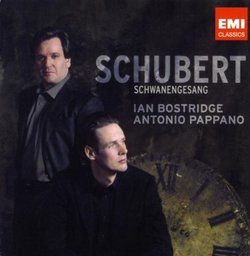Some very artful singing, but a light tenor doesn't belong i
Santa Fe Listener | Santa Fe, NM USA | 04/18/2009
(3 out of 5 stars)
"I was hoping not to be the first reviewer of this CD for fear of attracting the bloodhounds. I am skeptical that a light tenor can sing Schubert's weightiest songs, and many of those are to be found in his posthumous "Schwanengesang." The titanic sorrow expressed in Der Atlas, the enormous crescendo demanded in Der Doppelganger -- indeed, the whole Heine section -- contradicts the tenor voice. But that hasn't stopped Ernst Haefliger and Christoph Pregardien, or the composer himself, who actually wrote these songs for a tenor. If Ian Bostridge's voice is light even compared to theirs, his artistry considrably exceeds them, so I suppose he has a right.
To my ears, the sound of the voice is reedy, thin, without bloom, and therefore unappealing. I can't present myself as a fan, yet the lighter songs, lie Liebesbottschaft, are persuasively done here. Whenever Bostridge is called upon to sound like a young lover he does well. It msut be said, however, that his style is awfully mannered, too much so for innocent love or melancholy. Taste is taste, and one of my favorite singers, Elisabeth Schwarzkopf, is often accussed of mannered singing, too.
The very musical conductor Antonio Pappano replace Bostridge's long-favored accompanist, Leif Ove Andsnes, but he has to subdue the piano part just to make Bostridge sound credible in the heavier songs. Pappano makes little impression beyond restrained elegance and civilized caution -- there are some bold, forthright moment, happily, as in Der Atlas. As you can see, we might have been better off for a die-hard fan to give first impressions of this album, but there you go."
Better than most
Sterling Koch | Los Angeles, CA | 07/28/2009
(5 out of 5 stars)
"With all due respect to the very intelligent thoughts posted by the previous reviewer, I must disagree a bit. I would invite anyone to actually pick a song from this recording and compare it with pretty much any other version remembering that, yes, the cycle really was written for a tenor and I daresay that Schubert had that sound in mind. I think that you will find it significantly less "mannered" that pretty much anything else out there. Bostridge takes it fairly straight, with minimal (if any) operatic moments, no unnecessary slides or excessive bravado, and no bellowing. There are enough recordings of crooners and singers who believe that Schubert should be the German equivalent of Verdi. Yes, Bostridge is more restrained than most, but I believe the interpretation is quite valid and certainly effective here.
The previous reviewer mentioned a lot of big moments. I would take Ständchen as a better example, as it contains a good range of both pitch and dynamic. Bostridge's tone is warm and inviting (as it should be for the text), doesn't hold back when the moment calls for it, but also doesn't jump to forte just because the notes go up the scale. It's smart, not to mention incredibly beautiful. And you'd be hard pressed to find a German who seems to obviously chew and love the language like Bostridge does.
I'm not sure how it all would hold up in a recital hall (the piano is, as the previous reviewer notes, pretty restrained - delightfully so, in my opinion), but on a recording it creates some pretty magic moments. I'll admit I generally like most of Bostridge's recordings, but this one in particular stands out to me as being notably better than most others in a crowded list of Schwanengesang performers."


 Track Listings (18) - Disc #1
Track Listings (18) - Disc #1